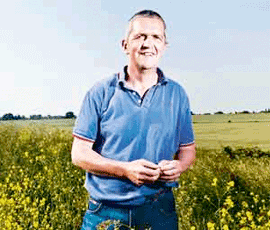Groucho Marx was wrong – clubs are great for farming

When it comes to clubs, I’m sometimes reminded of Groucho Marx’s caustic observation that he wouldn’t want to join a club that accepted people like him as members.
Nonetheless, agriculture is not short of clubs, societies and associations – and we are much the richer for it. In an age of impersonal, electronic communication where it is possible to exist like a well-connected hermit, the process of physically communing with your peers has never been more important.
As members of Young Farmers Clubs will tell you, there are some things in life that are much more fun when you do it with others rather than doing it on your own.
Similarly, one should never underestimate the therapeutic benefit of an eyeball-to-eyeball chat over a pint. In the company of your peers, a problem aired is often a problem shared and halved. Individual isolation is a plague on modern agriculture and we should treasure any structures that bring farmers together.
I’ve been lucky enough to be invited to some of the clubs and local organisations our industry boasts. It’s always impressed me how many there are. Just as you’ve done a talk to the Upper Chute Farmers Discussion Group, you find an invitation from the Lower Chute Agricultural Society. I very much doubt there is another industry that could boast such a network. Other professions such as architects, plumbers or accountants do not meet up with the regularity and the camaraderie that farmers do. One overriding and very positive reason for this is that farmers are usually happy to freely share information, where in other industries it would be seen as commercially sensitive and not to be given away for free. I have met a few curmudgeons in our industry who see sharing technical advice with a neighbour as foolishly helping a competitor, but fortunately these types are the exception, not the rule. Most of us see the challenge of battling with the elements to produce food as a common one that unites us. Consequently, any tips or guidance as to how we can do it better or more easily are altruistically shared.
It often perplexes me to see bodies such as DEFRA or Natural England struggling to constructively engage with the farming community, while failing to realise that the answer to their problems may already be out there, in the form of these local farmer groups.
Rather than setting up ‘DEFRA show farms’, Whitehall would do much better to have demonstration days on the farms of chairmen of local Ag Socs. Farmers are already well engaged with these groups, indeed they take a sense of ownership in them. Ideas disseminated and discussed through such networks are far more likely to take root at the farm level rather than pontificating them from on high.
The other imperative is that many of these local clubs are suffering from lower turnouts. As we know, the most devastating change our industry has seen over the last two generations has been the trend towards fewer farmers with less time. It is inevitable that this puts pressures on grass-roots organisations that need critical mass to prosper. For the reasons outlined above, it is very important we hang on to these clubs and societies – thus handing them onto the next generation. We will be a far poorer industry and community without them.
So I would appeal to anyone at the top of our industry who feels the need to reach out to the farming community to think local and use what we already have. Don’t try to reinvent the wheel.
Guy Smith comes from a mixed family farm on the north-east Essex coast. The farm is officially recognised as the driest spot in the British Isles. Situated on the coast close to Clacton-on-Sea, the business is well diversified with a golf course, shop, fishing lakes and airstrip.
